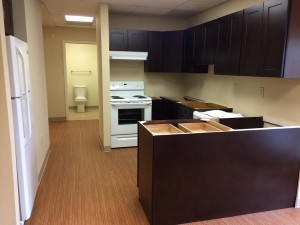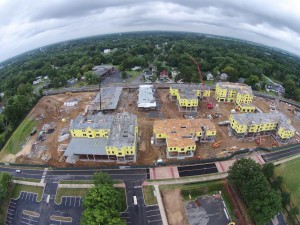By Natalie Kouba & Tom Kozlowski
Editor-in-Chief & Managing Editor

It has been four months since most students last saw developments in the construction of Campus Town. Rows of green fences still line Metzger Drive. Sounds of heavy industry clamor in the daytime air. To some, construction appears to be more of the same. And yet, the yellow-wrapped tops of new apartment buildings can be seen rising just over the fence, barren but progressing fast. There may not be much to see from outside the barriers, but within the construction site, Campus Town is beginning to bloom.
The steel structures of soon-to-be student apartments, retail space and restaurants are standing, but it is apparent that Campus Town still has a long way to go before it is ready to open. PRC Group, the developer for the project, has undertaken the now $86 million endeavor alongside Turner Construction, an international construction company hired to assist in the production. Together, they have implemented a comprehensive strategy for ensuring Campus Town’s continued developments and its eventual opening on schedule.
“Turner is here (because) they are probably the best in the industry for doing this,” said Greg Lentine, director of University Campus Development at PRC Group. “When we found out they were flying drones above (Campus Town), we thought that was pretty cool. But it’s not just for the pictures. They are tracking progress, making sure things are getting done the right way.”
On any given day, there are 90-120 workers on site. Through construction alone, the Campus Town project has created 6,000 to 10,000 jobs through employment pool expansion, according to Lentine. Expanding beyond the fence, part of the Campus Town project includes widening Pennington Road outside and thereby moving sewer systems, telephone poles, fire hydrants and curbs to allow for heavier traffic and a traffic light at the main entrance of Campus Town. All steel frames, fire retardant dorms, cinder block stairwells and concrete floors are all steps being taken to ensure fire safety throughout.
“My goal is to educate the students — I don’t want everybody asking, ‘What’s behind the green fence? Lets go see it’,” Lentine said. “I am happy to show it to people. What I don’t want is for them to come in here on their own.”
The next big change students can begin looking forward to is bricking. According to Lentine, they are running ahead of schedule and are confident they can achieve their goals on their currently scheduled dates.
Recently, PRC Group has been touring the site with retailers in the hopes of signing leases for promising businesses to flourish. Of the 83,000 sq. ft. of retail space, approximately 50 percent of it has been leased out, according to Lentine. So far, Piccolo’s Trattoria Italian restaurant, Red Berry frozen yogurt, Yummy sushi, Mexican Mariachi Grill and a Starbucks Coffee within the Barnes & Noble bookstore have all been signed.
“The retail can’t survive with just the college students ... we need the public so that their business comes here, and it is not only good for here, but benefits the community as a whole," Lentine said. “We are looking to have a company that will be successful.”
The 11,400 sq. ft. fitness center will be run and operated by the College and only open to the College community.


A Campus Police substation and IT room next to the fitness center will also be renting space on the Campus Town ground floor.
There is expected to be plenty of parking available for students and visitors as well. The PRC Group has calculated that there is .65 of a parking spot allotted to each student living in Campus Town, but since many students will not have cars, they are hoping to have enough. Additionally, there will be 300 retail spots available throughout the site.
While PRC Group is working on leasing out the 83,000 sq. ft. of retail space, the group’s first priority is having the student apartments ready and furnished for move-in.
“We have to be ready to get students in here next year, Aug. 15,” Lentine said. “Our application process started two weeks ago. We have 274 applications for apartments (as of Friday, Aug. 22).”
Priority housing based on academic year will determine who is selected for the student-only apartments, but it is expected that the 446 beds on Campus Town will fill up fast. Students who apply for the apartments have three days to complete and return the leasing packets — waves of which will begin to be released on Tuesday, Aug. 26 — before losing their places in the line for housing.
“Originally, there was supposed to be 327 beds,” Lentine said. “All of our market research here showed that the shortage of housing here needed about 600-700 beds.”
After negotiating with the College, however, PRC Group settled on 446 beds.
The College is not explicitly looking to increase enrollment with the appeal of Campus Town. Rather, it is a possibility to be considered in the future.
“Because the quality of facilities and amenities is very important to prospective students, however, it is quite possible that Campus Town, in addition to the excellent reputation of the school, will help us in our effort to recruit top students,” said David Muha, vice president of communications, marketing and brand management.
Housing in Campus Town is specially situated. While the apartments are more expensive than traditional off-campus housing — costing a student $6,544 per semester in a one-bedroom apartment, $6,003 in a two-bedroom and $5,462 in a four-bedroom — some could argue the benefits are worth the price. The apartments are technically off-campus housing while hosting the convenience of being physically on campus. Students have their own rooms with a double bed, and each apartment complex has a full kitchen, washer and dryer. Students will not even be required to purchase a meal plan since the housing is not operated through the College.
Capstone on Campus Management will manage housing, and with tight security according to Lentine. Students will need to use their keys to enter the lobby, elevator, apartment complex and individual rooms.
Originally scheduled in the hopes of opening around the 2014 Olympics, according to Lentine, discussions between the College and PRC Group, as well as surprises in the Campus Town lot, ultimately pushed the projected date back. The site conditions were not what was expected, as buried oil tanks and a swimming pool were discovered in the early stages of construction. Lentine explained how the fitness center, for example, was originally planned to be open to the public. However, after discussions between the College and PRC Group, it was decided that the fitness center should remain exclusive to the College community.
Collaborating in a public-private partnership, the College and PRC Group mutually benefit from the project. PRC Group takes on the full financial burden and risk involved in the Campus Town investment. Robert Kaye, CEO of PRC Group, has personally invested millions of dollars in private equity into the project. In turn, PRC Group will be positioned to collect future rent from retailers. It has been projected overall that over the next 20 years, Campus Town will produce $200 million in salaries, $37 million in tax revenue and $47 million to the College itself, making this a lucrative investment all around.
Although enthusiasm for the project springs from students, staff and developers alike, the Ewing community is equally anxious for its unveiling. According to Lentine, neighbors to the College and residents in Ewing voiced their excitement about Campus Town developments during town hall meetings.
“There is a coalition that wants the TCNJ students out of their neighborhood,” he said. “They say they disrespect the elders, (and) there’s partying and drinking. They want (students) out of their neighborhood, so the neighbors want this project and they want it now.”
Ewing residents will not only benefit by having fewer students roaming their sidewalks on weekend nights, but also from the economic advantages of a revenue-intensive community space.
“Campus Town is a win-win for TCNJ and Ewing,” Muha said. “It will create a vibrant center that will benefit both the campus community and area residents. PRC has done a great job in attracting tenants that will appeal to both audiences.”
Most of all, Campus Town will foster an urban and cultural focal point at the College that has long eluded students.
“We think this is going to become the center of life for the College,” Lentine said.
The wait for Campus Town continues to stretch on. But with PRC Group’s confidence in its schedules and the meticulous construction process underway, students can rest assured that what lies behind the green fences is already taking shape into a fundamental hub of life at the College.







